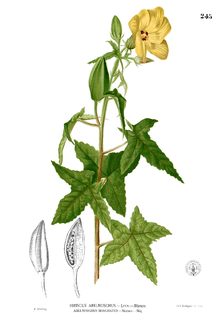Abelmoschus moschatus
Abelmoschus moschatus (Abelmosk, ambrette, annual hibiscus, Bamia Moschata, Galu Gasturi, muskdana, musk mallow,[2] musk okra,[2] ornamental okra, rose mallow, tropical jewel hibiscus,[2] Yorka okra) is an aromatic and medicinal plant in the family Malvaceae native to Asia and Australia.[2]
| Abelmoschus moschatus | |
|---|---|
 | |
| Scientific classification | |
| Kingdom: | Plantae |
| Clade: | Tracheophytes |
| Clade: | Angiosperms |
| Clade: | Eudicots |
| Clade: | Rosids |
| Order: | Malvales |
| Family: | Malvaceae |
| Genus: | Abelmoschus |
| Species: | A. moschatus |
| Binomial name | |
| Abelmoschus moschatus | |
| Synonyms[1] | |
|
List
| |
Characteristics
The seeds have a sweet, flowery, heavy fragrance similar to that of musk (hence its specific epithet moschātus, scientific Latin for ‘musk’).
Despite its tropical origin, the plant is frost-hardy.
Uses of the plant
Musk mallow seed oil was once frequently used as a substitute in perfumes for animal musk; however this use is now mostly replaced by various synthetic musks due to its high cost.
Culinary uses
It has many culinary uses. The seeds are added to coffee; unripe pods ("musk okra"), leaves and new shoots are eaten as vegetables.
Medicinal uses
Different parts of the plant have uses in Ayurveda herbal medicine, including as an antispasmodic and to treat gonorrhea.[3] However, use may result in phytophotodermatitis and it has not been proven safe for use during pregnancy and lactation.[4]
References
- "The Plant List: A Working List of All Plant Species". Retrieved June 14, 2014.
- "Abelmoschus moschatus". Germplasm Resources Information Network (GRIN). Agricultural Research Service (ARS), United States Department of Agriculture (USDA). Retrieved December 21, 2017.
- L. D. Kapoor (2000). Handbook of Ayurvedic Medicinal Plants: Herbal Reference Library. Taylor & Francis.
- "Wellness Library:Ambrette (Abelmoschus moschatus)".
- Brown, Deni (1995). The Royal Horticultural Society encyclopedia of herbs & their uses. London: Dorling Kindersley. ISBN 0-7513-0203-1.
External links
- Abelmoschus moschatus
- Abelmoschus moschatus
- Abelmoschus moschatus Medicinal Plant Images Database (School of Chinese Medicine, Hong Kong Baptist University) (in Chinese) (in English)
- Celtnet Spice Guide entry for Musk Mallow seeds, including recipes